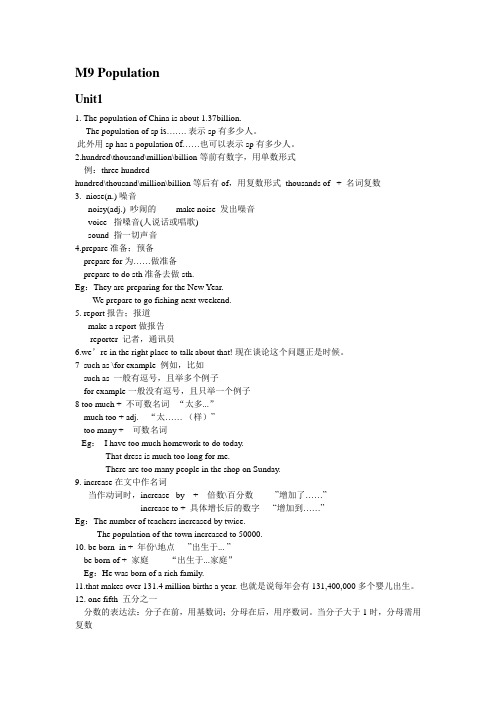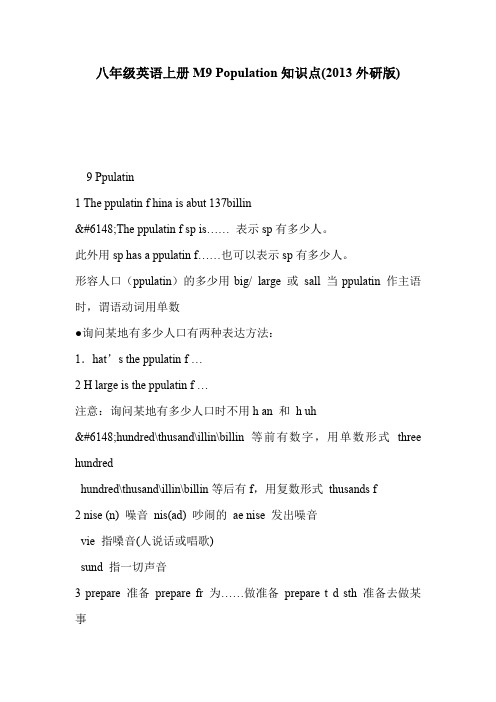外研版-英语-八上-外研八上Module9 Population 知识讲解及练习
- 格式:doc
- 大小:44.00 KB
- 文档页数:7

——————————新学期新成绩新目标新方向——————————Module9 PopulationUnit1 The population of China is about 1.37 billion.(读作one point three seven billion或one point thirty-seven)1. China has a population of about 1.37 billion. =China has about 1.37 billion people.=There are around 1.37 billion people in China. (注意population与people不连用)划线提问What’s the population of China?=How many people does China have?=How many people are there in China?a large/big/small population翻译:重庆的人口比北京多。
Chongqing has a larger/bigger population than Beijing.The population of Chongqing is larger/bigger than that of Beijing.Half of the population in the town are farmers.2. prepare (sth.) for…= get (sth.) ready for…note n. 笔记;便笺;钞票;音符;声调,语气vt. 注意;记录;对…加注释;指出take/write/make note s做笔记3. a report called the growing/increasing population 过去分词短语做定语grow-grew-grown v.增长(大);生长;种植;长高,变老4. We’re in the right place to talk about…正是谈论…的恰当时机。

M9 PopulationUnit11. The population of China is about 1.37billion.The population of sp is…….表示sp有多少人。
此外用sp has a population of……也可以表示sp有多少人。
2.hundred\thousand\million\billion等前有数字,用单数形式例:three hundredhundred\thousand\million\billion等后有of,用复数形式 thousands of + 名词复数3. niose(n.) 噪音noisy(adj.) 吵闹的make noise 发出噪音voice 指嗓音(人说话或唱歌)sound 指一切声音4.prepare 准备;预备prepare for 为……做准备prepare to do sth 准备去做sth.Eg:They are preparing for the New Year.We prepare to go fishing next weekend.5. report 报告;报道make a report 做报告reporter 记者,通讯员6.we’re in the right place to talk about that! 现在谈论这个问题正是时候。
7 such as \for example 例如,比如such as 一般有逗号,且举多个例子for example一般没有逗号,且只举一个例子8 too much + 不可数名词“太多...”much too + adj. “太……(样)”too many + 可数名词Eg: I have too much homework to do today.That dress is much too long for me.There are too many people in the shop on Sunday.9. increase在文中作名词当作动词时,increase by + 倍数\百分数”增加了……”increase to + 具体增长后的数字“增加到……”Eg:The number of teachers increased by twice.The population of the town increased to 50000.10. be born in + 年份\地点”出生于... ”be born of + 家庭“出生于...家庭”Eg:He was born of a rich family.11.that makes over 131.4 million births a year. 也就是说每年会有131,400,000多个婴儿出生。

八年级英语上册M9 Population知识点(2013外研版)9 Ppulatin1 The ppulatin f hina is abut 137billin᠄The ppulatin f sp is…… 表示sp有多少人。
此外用sp has a ppulatin f……也可以表示sp有多少人。
形容人口(ppulatin)的多少用big/ large 或sall 当ppulatin 作主语时,谓语动词用单数●询问某地有多少人口有两种表达方法:1.hat’s the ppulatin f …2 H large is the ppulatin f …注意:询问某地有多少人口时不用h an 和h uh᠄hundred\thusand\illin\billin等前有数字,用单数形式three hundredhundred\thusand\illin\billin等后有f,用复数形式thusands f2 nise (n) 噪音nis(ad) 吵闹的ae nise 发出噪音vie 指嗓音(人说话或唱歌)sund 指一切声音3 prepare 准备prepare fr 为……做准备prepare t d sth 准备去做某事Eg:The are preparing fr the Ne eare prepare t g fishing next eeend4 reprt 报告;报道ae a reprt 做报告reprter 记者,通讯员ntes 名词复数形式“笔记随笔” ae ntes 记笔记suh as \fr exaple 例如,比如t uh+不可数名词uh t+ad 太……t an+可数名词Eg:I lie fruit, suh as apples, bananasI have t uh her t d tdaThat dress is uh t lng fr eThere are t an peple in the shp n Sunda6 inrease b+倍数\百分数增加了……t+具体增长后的数字增加到……Eg:The nuber f teahers inreased b tieThe ppulatin f the tn inreased t 00007 be brn in+年份\地点I as brn in 198f+家庭He as brn f a rih fail8 ne fifth 五分之一分数的表达法:分子在前,用基数词;分母在后,用序数词。

Module9 PopulationUnit1 The population of China is about 1.37 billion.(读作one point three seven billion或one point thirty-seven)1. China has a population of about 1.37 billion.=China has about 1.37 billion people.=There are around 1.37 billion people in China.(注意population与people不连用)划线提问What’s the population of China?=How many people does China have?=How many people are there in China?a large/big/small population翻译:重庆的人口比北京多。
Chongqing has a larger/bigger population than Beijing.The population of Chongqing is larger/bigger than that of Beijing.Half of the population in the town are farmers.2. prepare (sth.) for…= get (sth.) ready for…note n. 笔记;便笺;钞票;音符;声调,语气vt. 注意;记录;对…加注释;指出take/write/make note s做笔记3. a report called the growing/increasing population 过去分词短语做定语grow-grew-grown v.增长(大);生长;种植;长高,变老4. We’re in the right place to talk about…正是谈论…的恰当时机。

Module9 PopulationUnit1 The population of China is about 1.37 billion.(读作one point three seven billion或one point thirty-seven)1. China has a population of about 1.37 billion. =China has about 1.37 billion people.=There are around 1.37 billion people in China. (注意population与people不连用)划线提问What’s the population of China?=How many people does China have?=How many people are there in China?a large/big/small population翻译:重庆的人口比北京多。
Chongqing has a larger/bigger population than Beijing.The population of Chongqing is larger/bigger than that of Beijing.Half of the population in the town are farmers.2. prepare (sth.) for…= get (sth.) ready for…note n. 笔记;便笺;钞票;音符;声调,语气vt. 注意;记录;对…加注释;指出take/write/make note s做笔记3. a report called the growing/increasing population 过去分词短语做定语grow-grew-grown v.增长(大);生长;种植;长高,变老4. We’re in the right place to talk about…正是谈论…的恰当时机。

外研版八年级上册英语《Module 9 Population,Unit 1 》授课说课稿一. 教材分析《Module 9 Population, Unit 1》是人教版八年级上册英语教材的一单元,本单元主要围绕人口增长这一主题展开。
通过本单元的学习,学生能够掌握描述人口增长的相关词汇和表达方式,理解人口增长对环境和资源的影响,以及学会如何提出建议和解决方案。
教材内容丰富,贴近学生生活,有利于激发学生的学习兴趣。
二. 学情分析根据八年级学生的认知特点和英语水平,他们对人口增长这一主题可能有一定的了解,但缺乏深入的认识。
在语言技能方面,学生已经掌握了基本的英语语法和词汇,但口语表达和写作能力仍有待提高。
因此,在教学过程中,需要关注学生的个体差异,调动他们的积极性,引导他们主动参与课堂活动。
三. 说教学目标1.知识目标:学生能够掌握描述人口增长的相关词汇和表达方式,理解人口增长对环境和资源的影响。
2.能力目标:学生能够运用所学的词汇和表达方式,进行口语交流和写作练习。
3.情感目标:通过本单元的学习,学生能够认识到人口增长所带来的环境问题,提高他们的环保意识。
四. 说教学重难点1.重点:描述人口增长的相关词汇和表达方式,人口增长对环境和资源的影响。
2.难点:如何运用所学的词汇和表达方式,进行口语交流和写作练习。
五. 说教学方法与手段1.教学方法:采用任务型教学法,分组合作学习,让学生在实践中掌握知识,提高能力。
2.教学手段:利用多媒体课件、图片、视频等辅助教学,增加课堂趣味性,提高学生的学习兴趣。
六. 说教学过程1.导入:通过展示我国人口增长的数据图表,引导学生关注人口增长这一主题。
2.呈现:介绍人口增长的相关词汇和表达方式,让学生进行口语练习。
3.讲解:讲解人口增长对环境和资源的影响,引导学生思考并表达自己的观点。
4.实践:分组进行讨论,提出解决人口增长问题的建议和方案。
5.展示:各组代表进行汇报,其他学生进行评价和补充。
Module 9. Population一、主题:人口(Population)二、必背单词名词:noise噪声;杂声notes笔记;随笔report报告;汇报problem麻烦;问题birth出生flat套房;公寓rubbish垃圾;废弃物pupil学生;(尤指)小学生pollution污染service 公共服务;服务动词:prepare准备;预备grow增长;增大cause造成;引起solve解决问题形容词:huge巨大的;庞大的quiet寂静的;安静的local当地的;本地的public公共的;公众的数词:billion十亿fifth第五;五分之一兼类词:increase n.增大;增长v.增大;增长三、常用短语1、prepare……for…… 为……准备……2、in the right place 在合适的地方3、in the world 在世界上4、one fifth of…… 五分之一……5、the world’s population 世界人口6、that is 也就是说7、hang on (口语)稍等8、write…down 写下……;记下……9、in the future 在将来10、at the start/end of… 在……的开始/结束11、a short/long time 短/长时间12、a piece of…… 一篇……13、close to 靠近14、move to 搬到15、in the city centre 在市中心16、close down (永久)关闭,关停17、a lot of traffic 许多车辆18、public services 公共服务19、help (to)do sth. 帮助做某事20、all over the world 全世界21、another huge problem 另一个大问题22、not……any more 不再……四、重点句型1、谈论人口的句型:(1)What is the population of Beijing ?(2)The population of China is about 1.37 billion.(3)Parkville was near Arnwick ,a city with 200,000 people.2、表示惊讶的句型:I c an’t believe it !3、表示请求问候的句型:Hang on a minute !五、模块语法1、冠词(不定冠词a/an、定冠词the和零冠词)2、数字(nine hundred and seventy-eight、two hundred and three)Module 9.Population详细笔记1. I’m preparing some notes for a report called "Our growing population.”我正在为一篇题为“我们日益增长的人口"的报告准备一些笔记。
Module 9 Population词汇精讲1. noise ,voice &sound(1)noise可以作可数名词,也可以用作不可数名词,表示“人们不愿听到的声音或嘈杂声”。
例如:I heard some strange noises last night. 昨夜我听见一些奇怪的响声。
There's a lot of noise here. 这个地方人声嘈杂。
(2)voice作名词,意为“声音,嗓音”。
用于人时,指说话、歌唱或发笑的声音,也可指发言权。
用于其它方面时,常含悦耳之声,如鸟鸣声,乐器声音等。
例如:He talked of his trip to Hong Kong in a cheerful voice.他兴高采烈地谈了他的香港之行。
She has a sweet voice. 她声音很甜美。
(3)sound泛指自然界的任何声音,不论其高低、是否悦耳等。
例如:I heard the sound of running water. 我听见流水声。
Light travels faster than sound. 光比声音传播得快。
2. hugehuge是常用词, 用于具体事物或人时, 指“体积或数量大得超过一般情况”; 用于抽象事物时, 作“巨大的”、“无限的”解。
例如:He stood tongue-tied before the huge audience.在大批听众面前他站着说不出话来。
【拓展】(1)big“大的,巨大的”,常指程度,范围,规模,容积,重量,数量等(还可表示“伟大,重要”之意)常可与large互换,多用于具体的、有形的人或物(其反义词多为little/small。
)例如:There is a big tree beside the house.房子旁边有一棵大树。
(2)great“大的,极大的,伟大的,重要的,超乎寻常”,常指面积,数量,程度(或指抽象的东西,如知识,能力,人格等),用来指人时,表示“伟大的,杰出的”,其反义词为little/small。
例如:We heard a great noise.我们听到一个很大的响声。
【注意】big还可以作“长大了”解,great有时可表达说话人的喜悦、赞扬等感情。
例如:Lily is big enough to ride a bike. 莉莉长大了,可以骑自行车了。
He's the greatest man I have ever seen. 他是我见过的最伟大的人物。
(3)large“大的,巨大的”,常指面积,范围,可表示数和量(当它直接用于人时,可表示身体的大),其反义词为small。
例如:They say China is a large and beautiful country.他们说中国是一个面积大而美丽的国家。
3. question&problemquestion和problem都有“问题”的意思,但用法不同。
question 指须解答的问题,是就疑问而言的;problem 指须解决的问题,是就困难而言的。
例如:What’s your question? Can you answer it?你的问题是什么?你能自己回答吗?What’s your problem? Can you solve it by yourself?你的问题(困难)是什么?你能自己解决吗?4. billion(1)billion是数词,意为“十亿”,当表示具体的“几十亿”时,用“基数词+ billion”,注意不加-s。
例如:The bank has assets of more than £1 billion.该银行有10亿多英镑的资产。
1.5 billion cubic meters of earth were/was moved.共搬运土方15亿立方米。
(2)billions of 表示“数十亿的,几十亿的”这时billion后要加-s,且后面有介词of,但是不能与数词连用。
例如:There are billions of trees in the forest. 森林里有几十亿棵树。
(3)表示数词的还有thousand“千”,million“百万”,hundred“百”。
它们的用法和billion 一样,可以用来表示约数和确数。
例如:There are millions of people in the country. 在这个国家里有数百万个人。
There are nine hundred students in our school. 我们学校有900名学生。
例如:Don’t eat too much sweet. It’s bad for your teeth.不要吃太多的糖,对牙齿不好。
There are too many books in the room. You can choose any one to read.房间里有太多的书了,你可以选择任何一本来读。
It’s much too cold outside. You should put on your coat.外面太冷了,你应该穿上外套。
6. quietquiet 意为“安静的,文静的”,可作定语或表语。
例如:They walked to a quiet place. 他们向一个安静的地方走去。
You have a cold, so you must keep quiet at home. 你感冒了,所以必须在家静养。
【拓展】calm,still,quiet与silent的辨析(1)calm 意为“镇静的;平静的”。
指不受干扰时的宁静、平静;指人时表示沉着的、镇定的。
(2)still 意为“不动的;静止的”。
指物理上的安静状态。
(3)quiet意为“安静的;静止的”。
指寂静的状态,没有吵闹、骚乱,指人表示娴静、文静。
(4)silent意为“沉默的;无言的”。
主要指人,指不发出声音或不说话,强调无声的状态。
例如:When we face danger, we should keep calm. 面对危险,我们应该保持沉着、冷静。
The baby kept still when she was taking photos. 当给这个婴儿拍照时,她一动也不动。
Be quiet, everyone. The teacher is coming. 同学们,安静!老师来了。
We shouldn’t keep silent when the teacher asks us some questions.当老师问我们问题时,我们不应该保持沉默。
【注意】quiet意为“安静的”,quite意为“相当”。
7. alsoalso意为“也”,一般放在句中。
用于be动词、情态动词、助动词之后,实义动词之前,比too要正式一些。
例如:He can speak English. I can also speak English. 他会说英语,我也会说。
He can also speak English. 他也会说英语。
I also like music. 我也喜欢音乐。
【拓展】(1)too意为“也”,一般放在肯定句句尾,前面一般用逗号与句子隔开。
例如:He can speak English. I can speak English, too. 他会说英语,我也会说。
(2)either意为“也”,用于否定句的句尾。
例如:He can’t swim. I can’t swim, either. 他不会游泳,我也不会。
(3)as well 意为“也”,用于肯定句句末,前面一般不用逗号。
例如:They want to play this game as well. 他们也想玩儿这个游戏。
8. 较大的基数词的读法(1)三位数的读法:第一个数字+ hundred + and + 后面的一位数或两位数字。
例如:202读作two hundred and two450 读作four hundred and fifty(2)千以上的数字的读法从右往左数,每三位点一个逗号;第一个逗号前读thousand(千),第二个逗号前读million(百万),第三个逗号前读billion(十亿)。
例如:1,111读作one thousand, one hundred and eleven1,451, 432 读作one million, four hundred and fifty-one thousand, four hundred and thirty-two1,857, 826, 724 读作one billion, eight hundred and fifty- seven million, eight hundred and twenty-six thousand, seven hundred and twenty-four词汇精练Ⅰ. 英汉互译。
1. 记笔记________2. 谈论_________3. move to ________4. (永久)关闭________5. as well ________6. 越来越多_______Ⅱ. 根据首字母提示或者汉语提示补全单词。
1. The ______(当地的)government took some steps to do that.2. It’s our duty to against th e ______ (污染).3. I don’t like the restaurant because of the bad _______(服务).4. It’s our duty to p______ the animals in danger.5. She wants to be a singer when she grows up because everyone says that she has abeautiful v_______.6. I can’t go out to play with you because I have too m______ homework to do.7. -What’s your p_______?-I can’t learn math well. I’m worried.8. I was born in a small village, but I want to live in a h______ city like Beijing.9. What’s t he p_______ of China?10. It’s a p______ school instead of a private school.Ⅲ. 用括号中单词的正确形式填空。